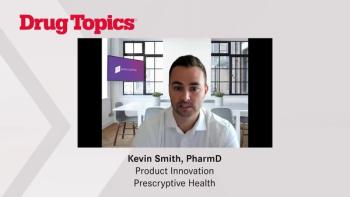
New audio technology aids patient compliance
Talking prescriptions help vision impaired patients take their medications.
TECHNOLOGY
New audio technology aids patient compliance
Medication vials will soon be chatting up visually impaired patients and others who have trouble reading prescription labels, thanks to a trio of electronic wizards that play back prerecorded messages.
Talking Rx (
With a suggested retail price of $39.95, the Talking Rx records prescription instructions in the pharmacist's voice. A family member or caregiver could also record the message in the patient's native language if necessary. The message can be changed but not accidentally erased. While the system is intended for the estimated 15 million Americans with some degree of visual impairment, it also helps the elderly and those who have trouble reading. For more information, phone Dobbins at (860) 426-0542.
"The Talking Rx is part of patient counseling and compliance," said Dobbins. "It provides patients with the education they need, and pharmacists can also be reimbursed for their cognitive services through the purchase of the product. We're hoping to get it covered by insurers, Medicare, and Medicaid."
Another entry, ScripTalk from En-Vision America (
When the company goes into full production, the prices will fall, said v.p. David Raistrick. The system, which will add less than a $1 per Rx, is being tested in pilot projects in two Chicago-area hospitals. Launch is anticipated this summer. For more information, phone Raistrick at (309) 452-3088.
"ScripTalk will generate tremendous goodwill for the pharmacy and attract new customers or retain old ones," said Raistrick. "It doesn't take the pharmacist's time to record the message, and it doesn't raise liability issues about what's in the message since it's the actual prescription instructions."
The Aloud Talking Prescription Labels from ASKO Corp. (
The Aloud system is currently available through the mail-order pharmacy Rx Partners, but ASKO is pursuing wider distribution in community pharmacies. The firm just launched a pilot test in five Wal-Mart pharmacies in Austin, Texas. For more information, phone Knoll toll-free at 1-(877) 732-9227.
"Aloud allows the pharmacist to give more detailed instructions to the visually impaired than Braille labels, which are typically limited to a couple of words," said Knoll. "It's really rewarding to see the way the patients light up the first time they hear the pill bottle."
Carol Ukens
Carol Ukens. New audio technology aids patient compliance.
Drug Topics
2001;9:85.
Newsletter
Pharmacy practice is always changing. Stay ahead of the curve with the Drug Topics newsletter and get the latest drug information, industry trends, and patient care tips.























